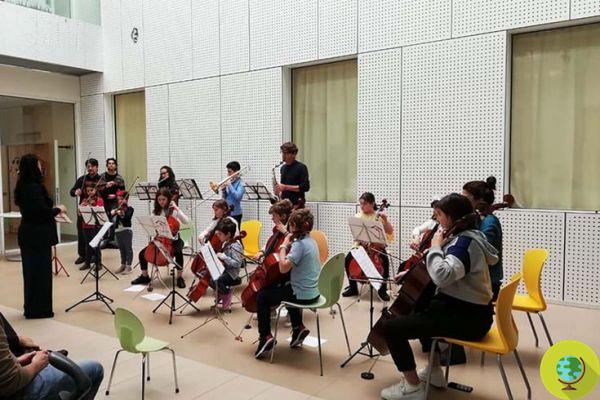How to apply the Montessori method to manage anger and prevent your children's whims, 10 useful tips.
Don't keep avocado like this: it's dangerous How to apply the Montessori method to manage anger and prevent tantrums.La anger it is a feeling that begins to emerge around the age of 2, when children feel they can defend their desires and interests in the face of a rejection that generally arises in the so-called moods. Managing the situation is sometimes difficult that's why it would be better to know how to prevent it.
Especially when we tell our children not to do something, it can generate in them a series of emotions that they cannot manage and that explode in the form of tantrums. Sometimes it comes to real scenes that we would like to avoid and that perhaps we could learn to prevent by following some advice that comes from the method of Maria Montessori.
The idea behind it is to create an environment suitable for the child in which he feels comfortable and therefore avoids being in that state that can make him "explode" at any moment.
Here are 20 Montessori tips to manage anger and prevent tantrums:
1) Greater autonomy and independence: prepare the house so that the child can develop independently by always having his own toys, tools and books available.
2) Motivation and real tasks: Just like adults, children get bored after a while and need new motivation. For example, you can involve them in housework to make them feel useful.
3) Always speak with respect, love and empathy: the tone to use is the same as that used for adults
4) Put yourself on their level: it is important to communicate with children by maintaining eye contact and therefore "lowering" to their level, calling them by name and talking about their feelings and ours

5) Pay enough attention to it: means both in terms of quality and quantity. If we are busy at home we will ask the child to help us, if we have to do outside we can bring some creative toys instead. However, it's important to always let him know what's on and ask for his opinion so that he doesn't feel left out.
6) Establish a routine: if the child knows the activities that are planned, he will welcome them more easily and avoid getting angry.
7) Beware of hunger and sleep: Tiredness and hunger increase the likelihood of having tantrums, always plan your mealtime and bedtime well.
8) Coping with new experiences: Lowering anxiety before having new experiences can be important. Getting out of the comfort zone is not easy for all children. If you have to face a new situation, just explain what it is to avoid surprises and the onset of anxiety.
9) Respond to its natural needs: a child after spending the day at school needs to move, play and be outdoors. We should therefore observe him, respect his needs and adapt his planning of the day also considering this aspect. If he is indoors and sitting all day doing activities, his unexpressed energy is more likely to turn into anger and tantrums.
10) Consistency in the family: it can happen that mom, dad and grandparents have different visions of how things should be done. However, this risks confusing children, so it would be good for adults to find a compromise by talking and establishing a unique way of dealing with situations.
11) Explain the reason for the rules: there are things on which you do not negotiate (for example sitting and binding on the car seat) but you must always explain to the child in a language that he understands why they are so important.
12) Emphasize the positives: even when a child does not want to do something, there is a positive side to be shown in it. Going back to the example of the car seat, you can tell the child that it is true that he will have to sit but he will be able to listen to songs, sing, look at the landscape, etc.
13) EmpathyIt is also important to put yourself in the child's shoes and look at the issue from his or her point of view.
14) Healthy and respectful relationships: we will not be able to maintain a good dialogue with our child if we do not know how to discuss with respect with the other people of the house
15) No blackmail: blackmail is a double-edged sword. We often enter a spiral from which it is difficult to escape.
16) Let them choose: instead of imposing it would be good to let the child make the decision for himself. Obviously, we must not give him maximum freedom but, for example, offer him two options.
17) Getting his attention: if you notice that anger is caused by a game, an activity, an environment or tiredness, you can immediately try to divert your attention to something else.
18) Avoid the abuse of no: always better to express yourself in a positive way. For example, if he is pulling an object, don't say “don't pull it” but “Be careful! If you pull it you could break it! ”.

19) Relativize and negotiate: if the child wants something you can negotiate with him. This is very useful as compromises are also used in relationships between adults.
20) And if it all fails ...: don't lose your temper. On the other hand, she will happen that the child feels anger since she is learning to manage her emotions, all that remains is to face it calmly and with love. She breathes deeply and give him a hug!
About tantrums about anger in children you may also be interested in:
- BASKET OF ANGER: WHAT IT IS, WHAT IT IS FOR AND HOW TO MAKE IT TOGETHER WITH THE CHILDREN (PHOTO)
- CHILDREN'S WHIMS: HOW TO BEHAVIOR TO SURVIVE
- Have you learned how to prevent anger in children? And how do you react to their whims?

























